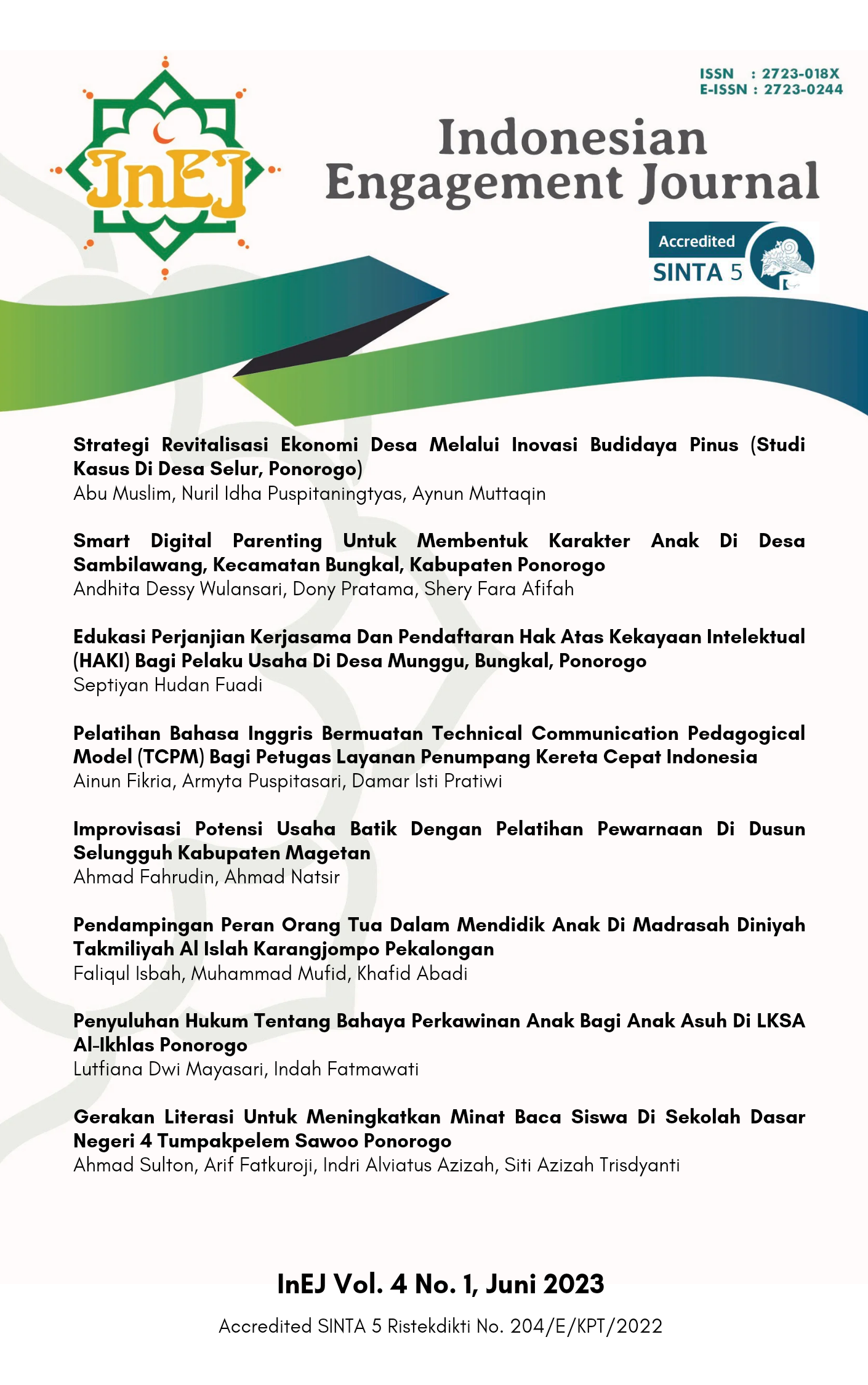STRATEGI REVITALISASI EKONOMI DESA MELALUI INOVASI BUDIDAYA PINUS DI DESA SELUR KECAMATAN NGRAYUN KABUPATEN PONOROGO
DOI:
https://doi.org/10.21154/inej.v4i1.8041Keywords:
Keywords, Pinus, ABCD Method, Selur VillageAbstract
Penelitian ini menggunakan pendekatan Asset-Based Community Development (ABCD) dalam memberdayakan budidaya pinus di Desa Selur, Ponorogo. Penanaman pohon pinus muncul sebagai peluang yang menjanjikan. Pohon pinus menawarkan potensi ekonomi melalui berbagai aspek, termasuk kayu dan getahnya. Dalam konteks ekonomi dan lingkungan yang berkelanjutan, pendekatan ini berhasil mengubah paradigma masyarakat dari petani garut menjadi petani penyadap getah pinus. Melalui tahapan inkulturasi, discovery, design, define, dan reflection, program ini secara efektif meningkatkan pendapatan masyarakat, menciptakan peluang baru, dan mendorong tanggung jawab sosial terhadap lingkungan. Implikasi ekonomi yang positif menghasilkan peningkatan pendapatan petani dan diversifikasi sumber pendapatan. Keberhasilan program ini bergantung pada pemahaman dan kepatuhan terhadap peraturan hukum, serta edukasi yang berkelanjutan. Studi ini menggarisbawahi pentingnya pendekatan berbasis aset dalam mendorong kesejahteraan ekonomi sekaligus memastikan keberlanjutan lingkungan yang seimbang.
References
Abbas, Sukardi, Juniartin Husen, Lintal Muna, Rosita Tabaika, and Dina Rahmawati. “Asset Based Community Driven Development (ABCD): Efforts to Develop Village Potential.” Archipelago 1, no. 2 (2020).
Anas, Jacques, and Laurent Ferrara. “Detecting Cyclical Turning Points: The ABCD Approach and Two Probabilistic Indicators.” Journal of Business Cycle Measurement and Analysis 2004, no. 2 (2004): 193”“225.
Arnaouteli, Sofia, Natalie C Bamford, Nicola R Stanley-Wall, and Ãkos T Kovács. “Bacillus Subtilis Biofilm Formation and Social Interactions.” Nature Reviews Microbiology 19, no. 9 (2021): 600”“614.
Barus, Ramsi Meifati, Alvi Syahrin, Syamsul Arifin, and Muhammad Hamdan. “Pertanggungjawaban Pidana Illegal Logging (Pembalakan Liar) Sebagai Kejahatan Kehutanan Berdasarkan Undang-Undang No. 41 Tahun 1999 Tentang Kehutanan Dan Undang-Undang No. 18 Tahun 2013 Tentang Pencegahan Dan Pemberantasan Perusakan Hutan.” USU Law Journal 3, no. 2 (2015): 106”“14.
“BPS Ponorogo.” Accessed August 11, 2023. https://ponorogokab.bps.go.id/publication/2022/09/26/58582a225e8f0a4d8400c9ff/kecamatan-ponorogo-dalam-angka-2022.html.
Cucunawangsih, Cucunawangsih, Ratna Sari Wijaya, Nata Pratama Hardjo Lugito, and Ivet Suriapranata. “Antibody Response to the Inactivated SARS-CoV-2 Vaccine among Healthcare Workers, Indonesia.” International Journal of Infectious Diseases 113 (2021): 15”“17.
De Andrade, Marisa, and Nikolina Angelova. “Evaluating and Evidencing Asset-Based Approaches and Co-Production in Health Inequalities: Measuring the Unmeasurable?” Critical Public Health 30, no. 2 (2020): 232”“44.
Elleby, Christian, Ignacio Pérez DomÃnguez, Marcel Adenauer, and Giampiero Genovese. “Impacts of the COVID-19 Pandemic on the Global Agricultural Markets.” Environmental and Resource Economics 76, no. 4 (2020): 1067”“79.
Elnahass, Marwa, Vu Quang Trinh, and Teng Li. “Global Banking Stability in the Shadow of Covid-19 Outbreak.” Journal of International Financial Markets, Institutions and Money 72 (2021): 101322.
Falkenberg, Adam, and Christian Esselin. “The Leaky Bucket: Managing User Retention on Social Platforms,” 2020.
Farida, Yuniar, Wika Dianita Utami, Aris Fanani, Latifatun Nadya Desinaini, and Silvia Kartika Sari. “Economic Empowerment of Housewives Based on OPOR (One Product in One RT) in Pojok Village of Magetan Regency, Using the Asset-Based Community-Driven Development (ABCD) Approach.” Engagement: Jurnal Pengabdian Kepada Masyarakat 6, no. 1 (2022): 16”“39.
Guardaro, Melissa, Maggie Messerschmidt, David M Hondula, Nancy B Grimm, and Charles L Redman. “Building Community Heat Action Plans Story by Story: A Three Neighborhood Case Study.” Cities 107 (2020): 102886.
Jones, Jennifer, and Rachel Masika. “Appreciative Inquiry as a Developmental Research Approach for Higher Education Pedagogy: Space for the Shadow.” Higher Education Research & Development 40, no. 2 (2021): 279”“92.
Krishnamoorthy, Sarayu, Basudev Swain, RS Verma, and Sachin S Gunthe. “SARS-CoV, MERS-CoV, and 2019-NCoV Viruses: An Overview of Origin, Evolution, and Genetic Variations.” VirusDisease 31 (2020): 411”“23.
Kumar, Veepan, Prem Vrat, and Ravi Shankar. “Prioritization of Strategies to Overcome the Barriers in Industry 4.0: A Hybrid MCDM Approach.” Opsearch, 2021, 1”“40.
Lam, David PM, Elvira Hinz, Daniel Lang, Maria Tengö, Henrik Wehrden, and Berta MartÃn-López. “Indigenous and Local Knowledge in Sustainability Transformations Research: A Literature Review.” Ecology and Society 25, no. 1 (2020).
Luger, Tana M, Alison B Hamilton, and Gala True. “Measuring Community”engaged Research Contexts, Processes, and Outcomes: A Mapping Review.” The Milbank Quarterly 98, no. 2 (2020): 493”“553.
Maclure, Liam. “Augmentations to the Asset-Based Community Development Model to Target Power Systems.” Community Development 54, no. 1 (2023): 4”“17.
Mathie, Alison, and Gord Cunningham. “From Clients to Citizens: Asset-Based Community Development as a Strategy for Community-Driven Development.” Development in Practice 13, no. 5 (2003): 474”“86.
Morehart, Christopher T, David L Lentz, and Keith M Prufer. “Wood of the Gods: The Ritual Use of Pine (Pinus Spp.) by the Ancient Lowland Maya.” Latin American Antiquity 16, no. 3 (2005): 255”“74.
Parhusip, Septaris Bernadetta, Yuki Hirose, and Naoto Matsumura. “Community Involvement in Forest Resource Utilization: Case Study of Rural Communities in Japan and Indonesia.” FORMATH 19 (2020): 19”“002.
Ravalier, Jermaine, Andrew McVicar, and Carol Munn-Giddings. “Appreciative Inquiry for Stress Management.” Qualitative Research in Organizations and Management: An International Journal 14, no. 3 (2019): 260”“79.
Rozaki, Zuhud. “COVID-19, Agriculture, and Food Security in Indonesia.” Reviews in Agricultural Science 8 (2020): 243”“60.
Rusydiyah, Evi Fatimatur. “Activity Pattern of Subject Teacher Forum in Improving Continuous Professional Development Program Through Asset Based Community-Driven Development Approach,” 18”“22. Atlantis Press, 2020.
Shkolnyk, Inna Oleksandrivna, Serhii Mykolaiovych Kozmenko, Jiri Polach, and Elżbieta Wolanin. “State Financial Security: Comprehensive Analysis of Its Impact Factors,” 2020.
Skhosana, Rebecca Mmamgoagi. The Design and Review of an Integrated Asset-Based Community-Led and Sustainable Livelihoods Practice Model for Poverty Alleviation. University of Johannesburg (South Africa), 2021.
Sofyan, Agung, Rita Retnowati, and Yossa Istiadi. “Utilization of Non-Timber Forest Products (Pine Resin and Resin) For Community Empowerment.” Journal of Science Innovare 4, no. 1 (2021): 06”“12.
South, J, J Woodward, S Coan, AM Bagnall, and S Rippon. “Asset Based Community Development: Evaluation of Leeds ABCD,” 2021.
Susilawati, Susilawati, Reinpal Falefi, and Agus Purwoko. “Impact of COVID-19’s Pandemic on the Economy of Indonesia.” Budapest International Research and Critics Institute-Journal (BIRCI-Journal) 3, no. 2 (2020): 1147”“56.
Whitney, Diana, Amanda Trosten-Bloom, and Maria Giovanna Vianello. “Appreciative Inquiry: Positive Action Research.” In Action Learning and Action Research: Genres and Approaches, 163”“77. Emerald Publishing Limited, 2019.
Yadav, Nagendra Prasad, Om Prakash Dev, Oliver Springate-Baginski, and John Soussan. “Forest Management and Utilization under Community Forestry.” Journal of Forest and Livelihood 3, no. 1 (2003): 37”“50.
Young, Oran R. International Cooperation: Building Regimes for Natural Resources and the Environment. Cornell University Press, 1989.
Downloads
Published
Issue
Section
License
Please find the rights and licenses in InEJ. By submitting the article/manuscript of the article, the author(s) agree with this policy. No specific document sign-off is required.1. License
The non-commercial use of the article will be governed by the Creative Commons Attribution license as currently displayed on Creative Commons Attribution-NonCommercial-ShareAlike 4.0 International License.
2. Author(s)' Warranties
The author warrants that the article is original, written by stated author(s), has not been published before, contains no unlawful statements, does not infringe the rights of others, is subject to copyright that is vested exclusively in the author and free of any third party rights, and that any necessary written permissions to quote from other sources have been obtained by the author(s).
3. User/Public Rights
The spirit of InEJ is to disseminate articles published are as free as possible. Under the Creative Commons license, InEJ permits users to copy, distribute, display, and perform the work for non-commercial purposes only. Users will also need to attribute authors and InEJ on distributing works in the journal and other media of publications. Unless otherwise stated, the authors are public entities as soon as their articles got published.
4. Rights of Authors
Authors retain all their rights to the published works, such as (but not limited to) the following rights;
Copyright and other proprietary rights relating to the article, such as patent rights,
The right to use the substance of the article in own future works, including lectures and books,
The right to reproduce the article for own purposes,
The right to self-archive the article,
The right to enter into separate, additional contractual arrangements for the non-exclusive distribution of the article's published version (e.g., post it to an institutional repository or publish it in a book), with an acknowledgment of its initial publication in this journal (InEJ: Indonesian Engagement Journal).
5. Co-Authorship
If the article was jointly prepared by more than one author, any authors submitting the manuscript warrants that he/she has been authorized by all co-authors to be agreed on this copyright and license notice (agreement) on their behalf, and agrees to inform his/her co-authors of the terms of this policy. InEJ will not be held liable for anything that may arise due to the author(s) internal dispute. InEJ will only communicate with the corresponding author.
6. Royalties
Being an open accessed journal and disseminating articles for free under the Creative Commons license term mentioned, author(s) aware that InEJ entitles the author(s) to no royalties or other fees.
7. Miscellaneous
InEJ will publish the article (or have it published) in the journal if the article’s editorial process is successfully completed. The editors of Journal may modify the article to a style of punctuation, spelling, capitalization, referencing and usage that deems appropriate. The author acknowledges that the article may be published so that it will be publicly accessible and such access will be free of charge for the readers as mentioned in point 3.




